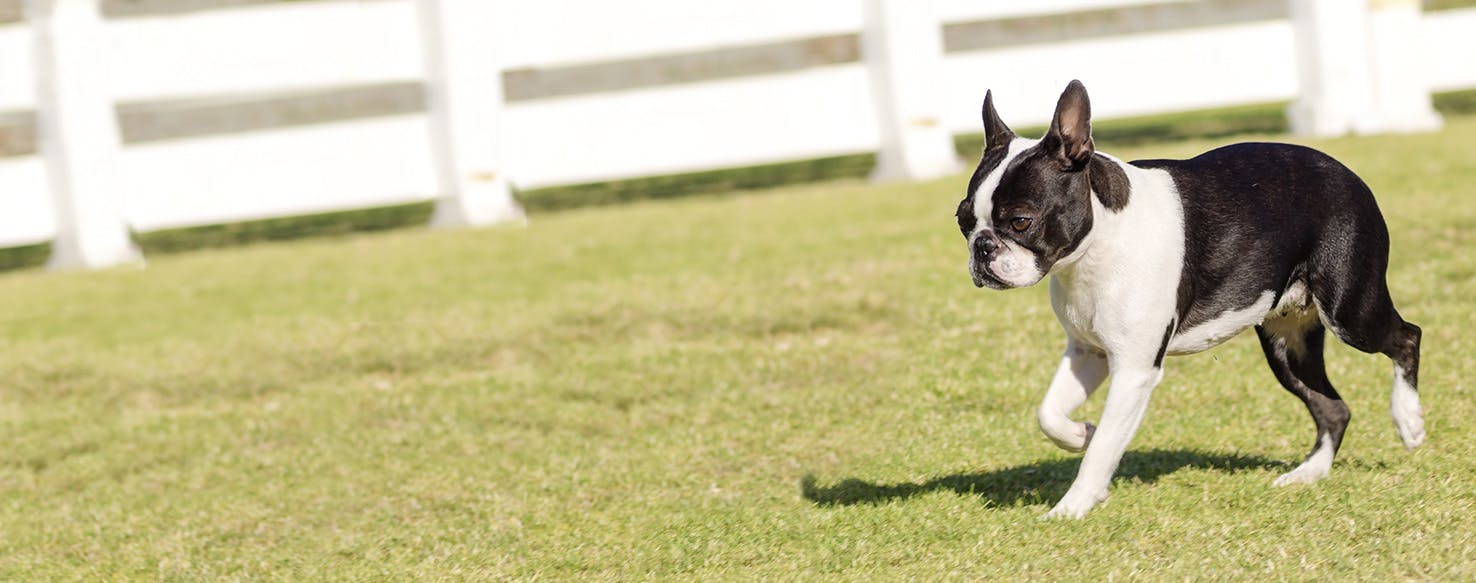- Home
- The Daily Wag!
- Behavior
- Why Do Boston Terriers Shake?

Common
Irregular
Your Boston Terrier, Tiny, is such a cute little dog with such spunk and personality, but he tends to shake a lot. He shakes after going for a doggy swim, he shakes when you leave for work, and sometimes he rocks, and you have no idea why. Why is Tiny so shaky? Is he prone to shaking because of his breed? What type of shakes are normal and which are not? You have heard that Boston Terriers are prone to certain health issues, but are not sure when Tiny’s shaking should be a concern. You think it’s important to find the answers to these questions for your best friend’s health.
While not all dog shaking is bad, Boston Terriers do have some health issues that could cause some shivers and quivers. One major health concern for this breed involves breathing, and when your furry pal can't breathe properly, he might start to exhibit the shakes. Tiny has smaller nostrils than larger dogs, but he has the same amount of tissue in his throat and nose as his larger canine friends. Because of this, the extra tissue can block the airway. The name of this issue is Brachycephalic Syndrome and remains one of the most common health issues associated with Tiny’s breed. Sometimes it gets so bad that your veterinarian may require surgery. Unfortunately, Boston Terriers are also more prone to orthopedic problems such as Patellar Luxation. This is when the patellar pops out of place and can cause extreme discomfort. Pain in dogs also leads to shaking. Also, Boston Terriers are known to be at risk for some spinal issues too.
This information may be traumatizing as you think about your beloved pooch, but knowing the health risks for Boston Terriers can help treat them when they occur. Also, know that there are reasons Tiny shakes that are not always medically concerning. Tiny’s name suits her because Boston Terriers are smaller dogs, and they simply get colder than larger dogs. When Tiny gets out from her lake swim, she shivers to generate heat, just like people do. Her small body and shorter coat don’t offer her as much heat as larger and furrier breeds. Boston Terriers are also known to display separation anxiety more than some other breeds. Tiny shakes when you leave because she doesn’t want you to go. Shaking in dogs can happen due to nervousness or excitement, so rest assured that some of Tiny’s quivers are not a cause for immediate concern.
Need advice about your pet's health?
Get answers fast from a veterinary professional 24/7 in the Wag! App.
Get Vet ChatIf you attribute Tiny's shakes to a breathing issue, then do not hesitate to take her to the vet. The same goes if you suspect a spinal problem. Also be aware of Tiny’s age. Arthritis and other health problems set in as dogs get older, and nimble bones and arthritis can result in shaking for older dogs. But if Tiny shivers after her lake swim, warm her up with a towel and give her a few extra cuddles, and just make sure the water is not too cold next time for her little body. When Tiny suffers from separation anxiety, this could be an issue for both of you. You know that you have to work, but you don’t want your dog in extreme anxiety all day, so what can you do?
In an interview conducted by Woof for Project Pawsitive, veterinarian, Boyle Brown offers these seven steps for this common Boston Terrier problem. First, establish a new greeting routine; enter the house relaxed, avoid eye and physical contact, adjust to a busy house with a lack of fussing, put your belongings down, take your dog out to use the bathroom, and after five minutes be yourself again. Although Brown explains that this process might be difficult for owners, it could result in fewer shakes for Tiny when you leave for work.
Unfortunately, there are some other concerning reasons why your Boston Terrier may shake. Another common reason is when a dog eats something poisonous. If Tiny ingests certain things such as chocolate, excessive salt, or chewing gum, she could exhibit tremors. If this occurs, call the Animal Poison Control Center at 888-426-4435. In addition to poisoning, distemper, a viral disease that affects dogs, could also be to blame for your Boston Terrier’s shaky ways. Along with the shakes, dogs with distemper discharge leaky fluid from the nose and eyes. If you suspect that Tiny has distemper, get her to the vet immediately. If Tiny's shakes are not due to a medical problem, but due to her small body not generating a lot of heat, then a doggy sweater becomes a good solution, especially in colder weather. And, as mentioned above, be mindful of cooler water temperatures, when it comes to Tiny’s swims and baths.
You are glad you delved into the causes for shaky Boston Terriers. You learned medical conditions that affect the breed and result in shakes, as well as other reasons Tiny might quiver. After examining the facts, you are relieved that Tiny’s shakes do not require medical attention and are not too concerning. She displays separation anxiety and gets cold easily, but you now know how to remedy these problems. You knit a doggy sweater, only let Tiny go swimming when it’s warm, and use Dr. Boyle’s seven steps to alleviate Tiny’s anxiety when you leave for work. You are grateful that Tiny’s shakes are not a holy terrier.
Written by a Retriever lover Amanda Clark
Veterinary reviewed by:
Published: 04/24/2018, edited: 01/30/2020
More articles by Amanda Clark

